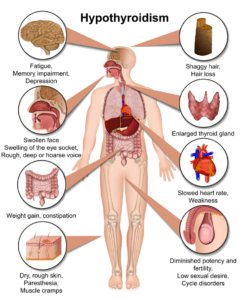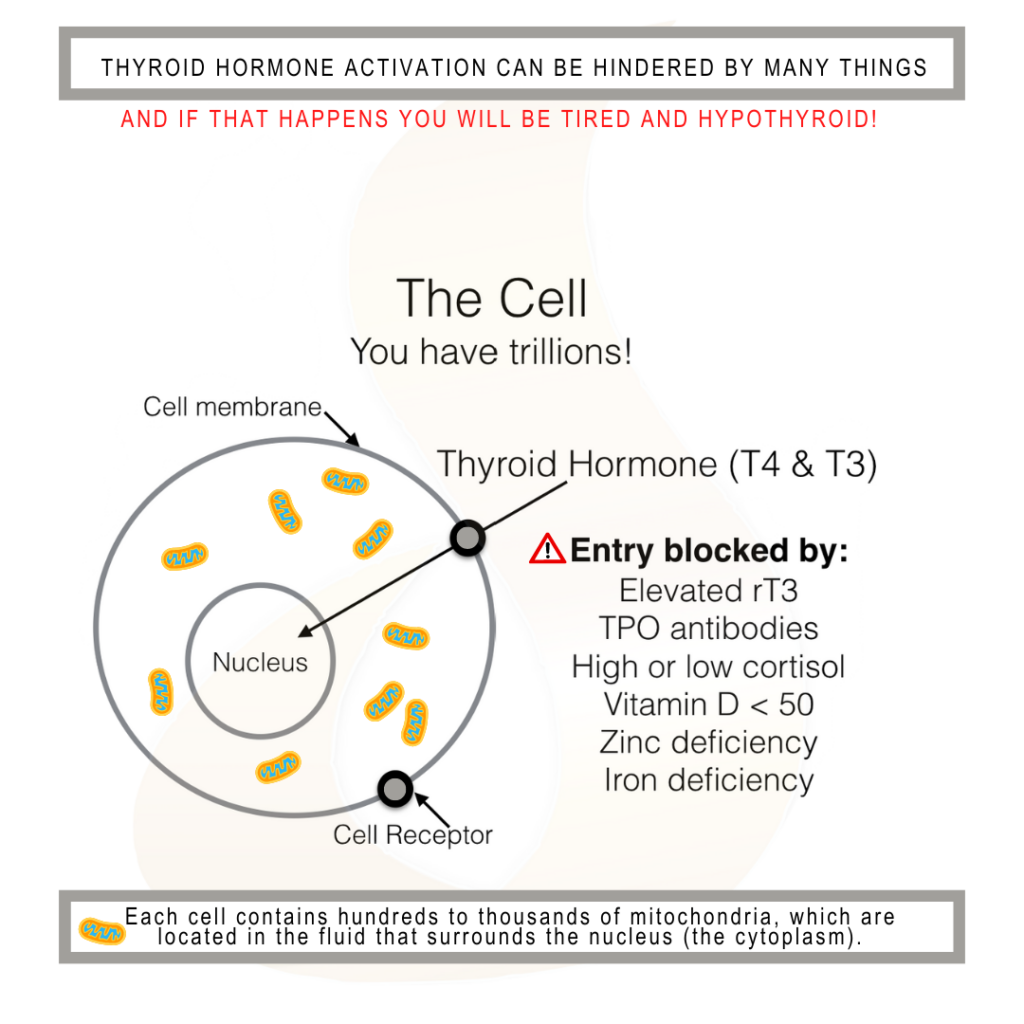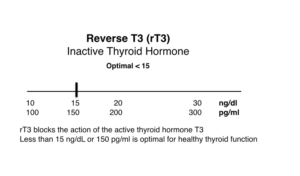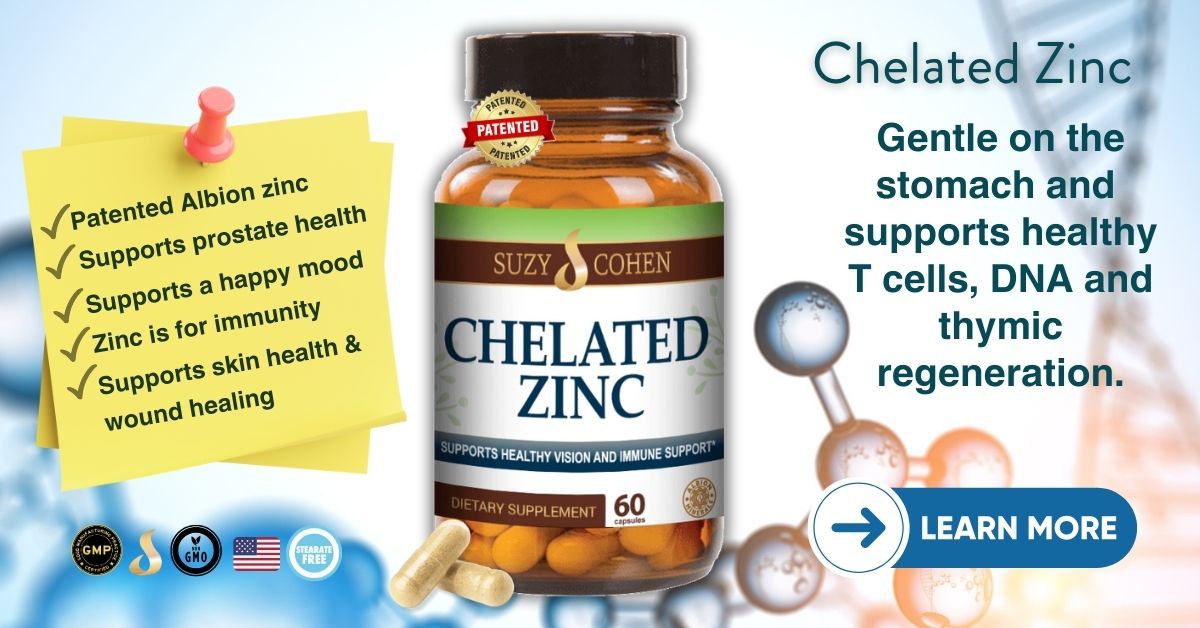What's On This Page?
ToggleIf you don’t absorb thyroid hormone, you won’t make T3 and never truly feel well. Mineral deficiencies are one cause. Find out 3 other main causes.
No matter what medication you take, or how much T4 your thyroid gland produces, it doesn’t matter if the cells aren’t taking up the thyroid hormone. In other words, you can take (or make) thyroid hormone, but if you have cellular resistance or some issue that prevents your cells from taking it up, you are still going to be hypothyroid and experience symptoms of the condition.
Symptoms of Low Thyroid Hormone Absorption

Symptoms vary but may include hair loss, fatigue, heart palpitations, anxiety, feeling cold, frequent infections, infertility, weakness, shortness of breath, problems with PMS and much more.
Many factors influence this cellular uptake. See the graphic I made for you here. I’m trying to show you how thyroid hormone has to penetrate the cell membrane, as well as the nucleus in order to do its job. Many things can interfere with that process, leaving you hypothyroid despite the medication you’re taking.

4 Reasons You May Not Absorb Thyroid Hormone
1. Elevated TPO Antibodies
If you have Hashimoto’s, your TPO antibodies will be higher than normal, and this prevents cellular uptake to some degree. If you’d like more information on rT3, click to read Measure Reverse T3 and Get Healthy.
2. Elevated Reverse T3 will hinder ability to absorb thyroid hormone
High levels of rT3 will reduce uptake. If you have excessive amounts of rT3, it may cause all the classic symptoms of hypothyroidism such as chronic, intractable fatigue, slow metabolism leading to weight gain, hair loss, low apathy, paleness and difficulty concentrating. I’ve written an entire blog on this condition, please read, Measure Reverse T3 and Get Well.

3. Abnormal cortisol blocks one’s ability to absorb thyroid
If you have either high or low levels of cortisol, you won’t absorb thyroid hormone. You could be high in cortisol during stressful periods of your life, or you may be totally depleted if you’ve endured many years of chronic illness or stress. Levels can be tested via urine. 4. Insufficient bioavailable vitamin D, ideally you want the number to be 40 – 50.
FYI, don’t over-supplement with D, it can cause mild heart palpitations. Take a nice amount, that’s right for you, don’t take excessive amounts. I see people taking 10,000, 20,000 and 50,000 IU. That is just too much!
4. Mineral deficiencies
Deficiencies in trace minerals (such as low ZINC and low iron) can hinder one’s ability to absorb thyroid hormone. This can happen to people who use antacids, or take heartburn/reflux pills. Also, it can happen to women who use oral contraceptives which are drug muggers of some of these important minerals. Zinc is a mineral that is critical for immune function, prostate health and skin/wound healing. If you are slow to heal little cuts, you may have a deficiency in zinc (or vitamin C).
Zinc deficiency is associated with alopecia (hair loss) and severe hypothyroidism. Straight from the International Journal of Trichology, “Zinc and other trace elements such as copper and selenium are required for the synthesis of thyroid hormones, and deficiency of these can result in hypothyroidism. Conversely, thyroid hormones are essential for the absorption of zinc, and hence hypothyroidism can result in acquired zinc deficiency.”
A heavy period for a long time will cause iron deficiency. Low levels of these minerals mean that you can’t pull in the thyroid hormone like you should, and might wind up deficient.
If you’d like to read more on this subject get my free ebook, Hypothyroidism: 5 Reasons You Don’t Get Well.
Or you can order a copy of this beautiful 150 page magazine with dozens of tips, recipes and thyroid, adrenal and hormone information: The title of the magazine is Health & Radiant Aging.

Suzy Cohen, has been a licensed pharmacist for over 30 years and believes the best approach to chronic illness is a combination of natural medicine and conventional. She founded her own dietary supplement company specializing in custom-formulas, some of which have patents. With a special focus on functional medicine, thyroid health and drug nutrient depletion, Suzy is the author of several related books including Thyroid Healthy, Drug Muggers, Diabetes Without Drugs, and a nationally syndicated column.


